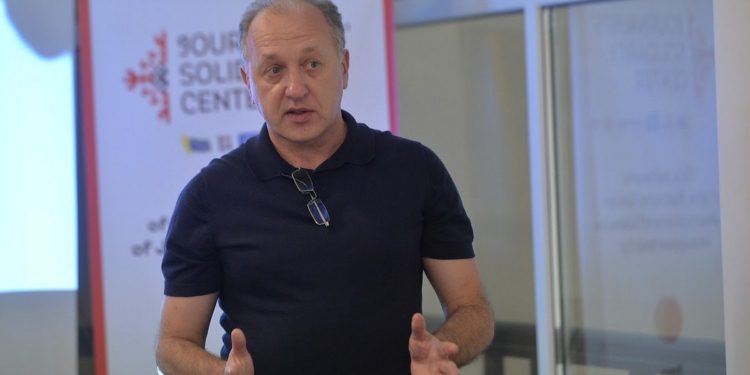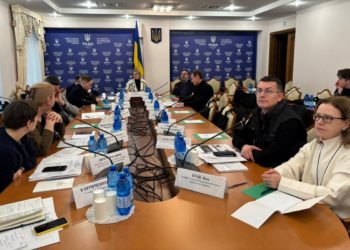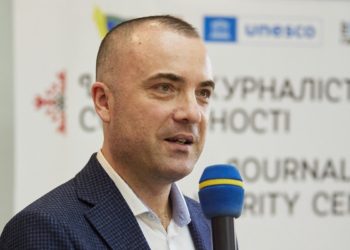Today, Ukrainian regional media are facing unprecedented challenges that threaten their existence. Yes, there are many difficulties, but we are obliged not only to survive, but also to develop and work further, to seek immediate and comprehensive solutions to preserve independent regional information, which is vital for communities in difficult times. Therefore, in these conditions, journalistic solidarity is very important, as well as strategic thinking to rebuild and strengthen the Ukrainian media space. After all, today it is not just about survival, but about the future of independent journalism in Ukraine, Secretary of the National Union of Journalists of Ukraine (NUJU) Kostiantyn Hryhorenko is convinced.
Despite significant difficulties in these challenging times, Ukrainian media professionals demonstrate amazing resilience and adaptability, but regional media have a number of critical needs.
- Financial instability. Most newsrooms, especially front-line media, have lost advertisers and subscribers. This problem applies to all media in Ukraine, not just those located in front-line areas. As a result, some media outlets have not just suspended their activities, but have completely stopped them. Using the example of the Kharkiv Region, we can state that out of 27 reformed publications, only 12 are published today. In the regional center, in Kharkiv, with a population of one and a half million, only one printed newspaper is published, Slobodskyi Krai. You can imagine the situation: according to the mayor of Kharkiv, Ihor Terekhov, today there are 1.3 million residents in the city, and only one newspaper is published for this number of people.
- Physical danger. It is clear that some newsrooms have found themselves in a combat zone, and journalists are forced to work under threats and shelling. Therefore, it is worth emphasizing: if there is an opportunity to relocate, do not delay; leave for a safer place. We have gone through this path on our example, so we advise you not to wait until, as they say, it is too late.
- Loss of premises and equipment. Again, I would like to give an example of our newspaper: we completely lost our newsroom premises, which are 170 square meters. The premises were given to us for 20 years for free use, but today we are forced to rent two rooms for the work of our creative team.
- Audience migration. The audience has also completely changed today. If earlier we clearly understood where our audience was – the print edition, the digital edition, now we must take into account that your audience today is an audience in Ukraine, an audience outside your region, outside your territory, outside Ukraine. And this must also be taken into account and addressed.
- Critical personnel shortage. I have had to change the editorial team twice in the past three years. After the explosions, people simply refuse to work in such dangerous conditions. In my opinion, to alleviate the severity of the issue, we should reach out to all educational institutions that train journalists, including journalism faculties. At least, I will speak for myself: we are ready to hire young specialists, even third- or fourth-year students.
NUJU’s Action and Assistance
Today, the NUJU has become not just a platform for protecting the rights of media workers, but a real center for coordinating assistance. However, when the NUJU attracted a large number of projects and grants, and the Union acts quite actively in the information field, our so-called colleagues, who constantly criticize us on their platforms, do not really like this. We should not pay attention to this, and we should take it calmly.
“I want to emphasize that the NUJU provided effective assistance to our newsroom, especially after we began to resume our work after a forced break. We were provided with generators, laptops, vests, and helmets. After all, without them, we cannot go to the front-line regions to prepare reports.
Our newsroom has also recently started using insurance. We contact the Association of Independent Regional Publishers of Ukraine and arrange insurance for journalists during their business trips to hot spots. I didn’t pay much attention to it before, but today, I see that it is very important, and I use such a service. And I recommend that journalists who go to the front-line territories, to the combat zone, arrange such insurance, if possible.
I also can’t help noting the activity of the NUJU, which is conducting constant negotiations with international organizations on sustainable financing and support for regional, local media in Ukraine.”
Ukrainian Media Restoration Strategy
“Today, I don’t want to talk only about survival; today, we need to talk about restoration and development. Once again, I draw your attention to the fact that any crisis presents new opportunities, which can be discovered through projects, grants, digitalization, and other initiatives.
If we did not have digital platforms and our website, there would have been no media outlet in the Izyum district covering the events during the temporary occupation. We were the only media outlet in the Izium District, providing the population with constant updates on the situation in the temporarily occupied territory for six months.
Therefore, I am very pleased that, over the past 3 years, local and regional newsrooms have created their own websites, attended seminars and training sessions on the need for digital platforms, and are developing their presence on social networks. After all, without this, there are simply no prospects for moving forward.
Decentralization of information
We need to strengthen the voice of regional media. We cannot focus only on the United Marathon on central TV channels. We need to adapt all our regional news in such a way that they are also widely represented at the regional and central levels.
We, the front-line newsrooms, constantly exchange information between neighboring regions, in particular, the regions close to Izium – Lyman, Sloviyansk, Kupiyansk, and use the information provided by our colleagues. After all, we know that this information is verified, tested, and reliable. This is particularly important in front-line areas, where we frequently observe abuse in various social networks, especially during enemy attacks, when they cover explosions, arrivals in cities, towns, and other locations. We also have our own photos and videos, which show us visiting the sites of explosions and infrastructure destruction, but we’re not in a hurry to publish everything we know. As is appropriate in these times, we are taking a break, and only after official messages from military administrations do we inform our readers.
Resources and Partnership
The role of international partners in supporting the media is very important, and we must frankly say so. If there were no international support today, we would hardly have resumed our work after de-occupation when we returned home. True, our newsroom, for example, did not feel the closure of USAID programs, but we see that American support has affected grant and project programs for Ukrainian media. We need to continue this work. And now the Union is actively in contact with our international unions, with the embassies of European countries, with the U.S. Embassy regarding media support. This work must be continued.
I constantly repeat that it is necessary to constantly convey words of solidarity and support to newsrooms that are in the combat zone, to draw attention to the fact that we have not forgotten our colleagues, that the Armed Forces will liberate the temporarily occupied territories.
Kostiantyn Hryhorenko, the NUJU Secretary/editor-in-chief of the Obrii Iziumshchyny newspaper from the Kharkiv Region.
***
Regional media during the war: from survival to development
 REFERENCE INFORMATION: Kostiantyn Hryhorenko – editor-in-chief of the Obrii Iziumshchyny newspaper, restored after the occupation, is well-known among Ukrainian media professionals. And the experience of Obrii 1919 LLC, including the experience of restoring the newspaper after de-occupation, which Kostiantyn Hryhorenko generously shares, is useful to many publications.
REFERENCE INFORMATION: Kostiantyn Hryhorenko – editor-in-chief of the Obrii Iziumshchyny newspaper, restored after the occupation, is well-known among Ukrainian media professionals. And the experience of Obrii 1919 LLC, including the experience of restoring the newspaper after de-occupation, which Kostiantyn Hryhorenko generously shares, is useful to many publications.
***
On July 3, 2025, an expanded meeting of the Board of the NUJU was held, which was attended by more than 50 representatives of the organization’s governing bodies. The main issues on the agenda were implementation of the priority areas of the NUJU activity in 2025 (safety of journalists, support for prisoners, assistance to front-line media), the activities of the network of Journalists’ Solidarity Centers (JSC), support for regional media, as well as organizational issues regarding the creation of new regional structures in Odesa. The participants unanimously adopted a statement of solidarity with Ukrainian journalists in russian captivity and a resolution on the need for systematic support for local media.

 THE NATIONAL UNION OF
JOURNALISTS OF UKRAINE
THE NATIONAL UNION OF
JOURNALISTS OF UKRAINE
















Discussion about this post